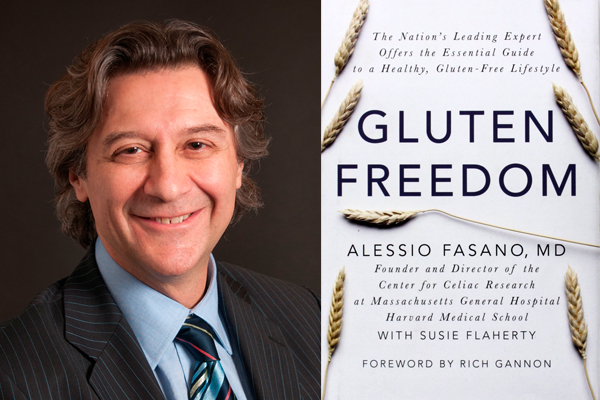Dr. Alessio Fasano talk about his brand new book, Gluten Freedom. Dr. Fasano is a world-renowned celiac expert and director of the Center for Celiac Research & Treatment at Massachusetts General Hospital for Children. He explores topics from the myths being spread about celiac disease to the search for markers of gluten sensitivity, how research is zeroing in on the gut “microbiome” and the center’s ground breaking work into celiac disease prevention.
You’ve been focused on celiac disease for many years, what made you decide to write the book now?
Dr. Alessio Fasano: Interesting question. I personally had never thought in my life that I would write a book like this. I was forced to do it actually, because when we started this journey many years ago, we faced a major challenge: totally oblivious knowledge about celiac disease; nobody knew anything. There was very little information about the gluten-free diet, it was perceived to be non-existent in the United States, confined to northern Europe, and so on.
And then we started this journey. And we created – at least I believe we were one of the major players in creating – this explosion of the issue and awareness that made the pendulum swing all the way in the opposite direction. Now I see people who claim to be experts, making some statements that really disturb me a great deal.
So you wanted to set the record straight?
Dr. Fasano: Absolutely. Because there’s a lot of confusion if you are an individual who wants to understand what this is all about. You have very confusing, sometimes contradictory information, and you are left with this confusion in your mind – “where am I going to go from here?”
Why do you think celiac disease and gluten sensitivity have had such a dramatic increase in prevalence in the recent past?
Dr. Fasano: I believe there are two components of this increase. First – increased awareness. Again, when we started this journey we were told: “celiac disease never landed in North America and never will, we’re just different, and that’s the end of the story”.
That was a very bad feeling for me, because the ingredients of the recipe were here, and yet we didn’t have the problem. So the question was, “How come? What’s going on?”
When we started to look into this, we realized that we are not different from Europe. And it took a while to educate health-care professionals that, despite what we were taught in medical school, celiac disease exists in the United States. And when you start to look into it, you find it.
The second component is that there is a true increase in the prevalence over time. And that’s not unique to celiac disease or gluten sensitivity; it’s what we see in many other autoimmune diseases. We’re in the midst of an epidemic.
You mention in the book that not everyone with a genetic predisposition for celiac disease will in fact go on to develop the disease. Does that mean there is something in the environment that’s ‘triggering’ celiac disease in people?
Dr. Fasano: Until the recent past, the answer was “it’s gluten, and therefore if you’re genetically skewed and you ingest gluten, it’s destiny that you develop it.” Not anymore. There was an interesting study that we did in healthy adults where in a 50-year timespan we saw celiac disease double every 15 years. These people ate gluten for decades without getting sick, and now all of a sudden they develop the disease.
This means that sure, you have to have the genes. Sure, you have to have gluten. They’re absolutely necessary, but not sufficient. Something else needs to be in the picture that leads to this problem. Personally, I believe it is a change in the composition of the microbiome that can be what tilts you from health to disease.





